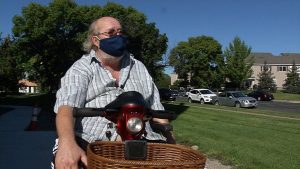The Separation Struggle: COVID-19’s Impact on Seniors
The COVID-19 pandemic has hit older adults harder than any other age groups when it comes to mortality rates. As seniors navigate life trying to avoid COVID-19, they’re also faced with another issue: separation.
Life In Isolation
For 64-year-old John Fisher, a simple conversation means the world to him because most days it’s just him and his apartment.
“Nobody ever stops to say ‘hi’ to me,” said Fisher. “It’s just me and my apartment; we’re best buds.”
Fisher lives at Brooks Landing Senior Community in Brooklyn Park. In the midst of a pandemic, it’s too risky for Fisher to go anywhere else.
“As you see, I’m a little overweight and I’ve had a couple heart attacks. I’ve had a couple strokes,” he said.
Also going on two years with throat cancer, Fisher is losing hope, calling the pandemic an “endemic” because “it’s never going to end.”

64-year-old John Fisher.
About 10 miles away, in a Brooklyn Center Apartment, 67-year-old Cathie Guerrido is also trying to pass the time.
“I like to make things,” she said. “I like to make crafts. I look at a lot of YouTube, I like to watch different ministries.”
Because Guerrido has diabetes and a partial foot amputation, she can only do so much. COVID-19 delayed all of her medical appointments and driving isn’t an option.
“I have to use taxi to go to my appointments. That’s another thing, you don’t know how many people have been in the taxi and things like that,” explained Guerrido.
To avoid COVID-19, seniors like Guerrido and Fisher stay close to home, where only limited friends and families scan visit.
But dodging the disease isn’t easy, especially when loneliness kicks in and families are separated.
Separation
June Linnertz went through an emotional first three months of the pandemic when her dad, Jim Gill, lived in a memory care unit at Cherrywood Pointe of Plymouth.
“A lot of sleepless nights, you’re worrying about him nonstop, how many more falls is he going to sustain?” said Linnertz. “We could call but it was a struggle for him to pick up the phone. That was how we communicate that way.”
Linnertz said her dad couldn’t understand why nobody was visiting him and why he was stuck in his room. Eventually Gill was placed in hospice and Linnertz was able to see him in-person for the first time in three months.
“You’re confined to 500 square feet in your own room all day long,” said Linnertz. “That’s a long day, and you’re going to deteriorate very quickly and that’s what happened to our dad.”
Just two days later, Gill died. That final visit meant everything to Linnertz.
“There’s guilt too, was there something more that can be done with my dad? I can’t imagine what went through his head,” Linnertz said.
COVID-19 Mortality Rates
The Centers for Disease reports that 8 out of 10 COVID-19 deaths in the country have been in adults 65 years old and older.
In Minnesota, 86% of the state’s COVID-19 deaths have been age 65 and above. Among the more than 2,000 Minnesotans who have died from COVID-19 related complications, about 75% had been living in long-term care or assisted living facilities.
Communities Help Seniors
Communities in the northwest metro have helped bridge the isolation gap. Brooklyn Park police and the city of Plymouth have encouraged volunteers to write to seniors through programs such as “Dear GG” and “Plymouth Post.”
“When’s the last time anybody’s received a card? Handwritten, saying ‘I care about you, I’m concerned about you. I want to let you know that you are loved and you’re not alone.’ How amazing of an impact could that be?” said Jackie Maas, Plymouth’s volunteer coordinator.
“I think it’s just a chance for community members to step up and engage with one another in a way that was safe,” explained Kim Czapar with the Brooklyn Park Police Department.
CEAP, a Brooklyn Center-based food shelf, also stepped up to make sure those they server feel cared for. Meals on Wheels volunteers make weekly care calls to about 150 participants.
“If I can sense that they’re lonely that day or maybe a little down, I’ll take whatever extra time to try and cheer their spirits or give them that air to talk to,” said Rachel Franklin, coordinator for Meals on Wheels.
How to Help Elderly Loved Ones
If you or a loved one needs resources such as home-delivered meals, prescription drug delivery or transportation, you can call 1-800-333-2433 or visit the MN Board of Aging website.
- Click here for more special reports
Brooklyn Center | Brooklyn Park | Champlin | Crystal | Golden Valley | Maple Grove | New Hope | Osseo | Plymouth | Robbinsdale | Rogers | Twin Cities


